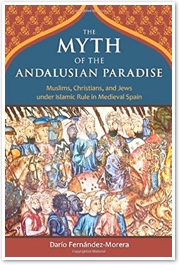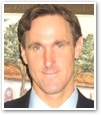Islam's Inexorable Impulse
- MATTHEW HANLEY
We have ample occasion these days to be reminded that Christian martyrs can be a catalyst for a new rebirth.
 You know: "the blood of the martyrs is the seed of the Church." There is undeniable historical truth to that, but unfortunately there is another way, pace Tertullian, to look at it: the blood of the martyrs also builds up the house of Islam.
You know: "the blood of the martyrs is the seed of the Church." There is undeniable historical truth to that, but unfortunately there is another way, pace Tertullian, to look at it: the blood of the martyrs also builds up the house of Islam.
Some may have heard that Islam "spread by the sword" way back when. Fewer realize the extent to which the unremitting threat of bloodshed and other indignities against those who break rank has provided more than sufficient inducement for inhabitants of vast swathes subjugated territories to remain Muslim. The stunted horizons imposed upon those masses down through the generations — an attenuated form of suffering — compounds the initial iniquity visited upon the slaughtered innocents.
Indeed, some leading figures in the Muslim world openly maintain that if the death penalty for apostasy were not built into Islam, it would not have originally become so entrenched and may have even faded long ago. Even if that seems implausible, the fact that, for all its force, Islam leans so heavily on compulsion, paradoxically bespeaks a certain fragility.
The point is that once Islam gobbles up new lands (or establishes beachheads in pockets of the West today), it imposes a highly effective death grip — Iberia being the most notable reversal. And anyone who thinks that Spain under Muslim rule was a golden moment of harmonious, enlightened multiculturalism — the shibboleth most people have been fed — should read Dario Fernandez-Morera's new goldmine of a book The Myth of the Andalusian Paradise: Muslims, Christians, and Jews under Islamic Rule in Medieval Spain.
When, for example, the reconquista reached Valencia (1238) and Granada (1492), there were virtually no Christian inhabitants left. Remember, it all started with a modest number of jihadists, but pressure to submit to the ways of Islam (the word sharia actually means "the way," thereby signaling a clear departure from Christian thought) inexorably mounted when and where it could. As it always does.
How they came to subjugate and the conditions that characterized their rule will sound familiar: the beheadings, crucifixions, horrific sexual abuse, material confiscations, and so forth. It's all there. And authoritatively documented. That alone is eye opening, but Fernandez-Morera further educates by exposing the underlying motivations for the false "model of tolerance" narrative — which mirror today's maddening "Baghdad Bob" like denial of obvious reality in the face of self-proclaimed Islamic atrocities.
The irreligious and therefore imperiled Syrian born poet Adonis — regarded as one of the finest in Arabic today — is not alone in bemoaning the listlessness Islam leaves in its wake. More provocative, however, is his contention that "it will end." This stems from his observation that "Islam does not contribute to intellectual life, it suggests no discussion . . . it produces no thinking, no art, no science, no vision that could change the world." That sounds more like a kind of humanitarian catastrophe than the "great" civilizing force that it is so reflexively credited to be.
His claim that it will die out is bold. That's unlikely, even outlandish, although there are grounds for thinking it, like Communism, is bound to collapse because of its internal brittleness and contradictions. And yet its fiercely tribalistic features and 1400 years of staying power suggests it won't even be held in check without a vigorous spiritual and physical countervailing force — neither of which the West seems willing to marshal at this urgent moment.
There is something else about Adonis' reference to a lack of thinking, which of course is not to be equated with a lack of innate intelligence. Hannah Arendt felt that was the most detectable characteristic of Hitler's henchman Adolf Eichmann; among her many insights into the workings of totalitarianism, she notes the feature that stood out most to her about Eichmann was "something entirely negative: it was not stupidity but a curious, quite authentic inability to think."
Virulent disdain towards the Jews is thus not the only commonality between the Islamic world and the Third Reich. And as for us, what is political correctness but an enforced lack of thought? Or the attempt to have us participate in lies, which Solzhenitsyn reminds us is always in our mainly neglected power to refuse.
Islam is certainly no exception to the rule, expressed by the late Italian philosopher Augusto Del Noce, that "in every totalitarian system, what starts as persecution of religion mutates into persecution of reason." Indeed, this would seem to be an apt overall characterization of Islam's modus operandi, indicating that totalitarianism is far from being solely a 20th century phenomenon.
Fernandez-Morera also notes something about music — almost in passing — that is worthy of amplification, considering that some regard it as the crowning cultural achievement of the West, and that people from all walks of life find themselves intuitively drawn to Gregorian chant. Although not strictly prohibited by Islam, music has historically been considered "an enemy of piety" and, in the main, impeded as much as possible. Another prototypical totalitarian, Lenin, was not fond of music either:
I can't listen to music too often. It affects your nerves, makes you want to say stupid nice things and stroke the heads of people who could create such beauty while living in this vile hell.
So, the feeling of warmth for one's fellow man must be held in check; music Lenin can't help but admit, is beautiful only engenders warmth and therefore jeopardizes an envisioned utopia.
The great anthropological significance in that passage — its searing inhumanity — surfaces as a feature of Islamic doctrine as well. Feeling for those outside the umma is actively discouraged — so much so that if a Muslim takes a non-Muslim wife, he is to hate her, inwardly.
If the light of day is the best disinfectant, let us hope that the shuttered windows in our collective minds are opened wide — without further delay.
 This is Meaghen Gonzalez, Editor of CERC. I hope you appreciated this piece. We curate these articles especially for believers like you.
This is Meaghen Gonzalez, Editor of CERC. I hope you appreciated this piece. We curate these articles especially for believers like you.
Please show your appreciation by making a $3 donation. CERC is entirely reader supported.

Acknowledgement
 Matthew Hanley. "Islam's Inexorable Impulse." The Catholic Thing (July 7, 2016).
Matthew Hanley. "Islam's Inexorable Impulse." The Catholic Thing (July 7, 2016).
Reprinted with permission of The Catholic Thing.
The Author
 Matthew Hanley, along with Jokin D. Irala, M.D., is the author of Affirming Love, Avoiding AIDS: What Africa Can Teach the West published by the National Catholic Bioethics Center. He is also a regular contributor to The Catholic Thing.
Matthew Hanley, along with Jokin D. Irala, M.D., is the author of Affirming Love, Avoiding AIDS: What Africa Can Teach the West published by the National Catholic Bioethics Center. He is also a regular contributor to The Catholic Thing.




